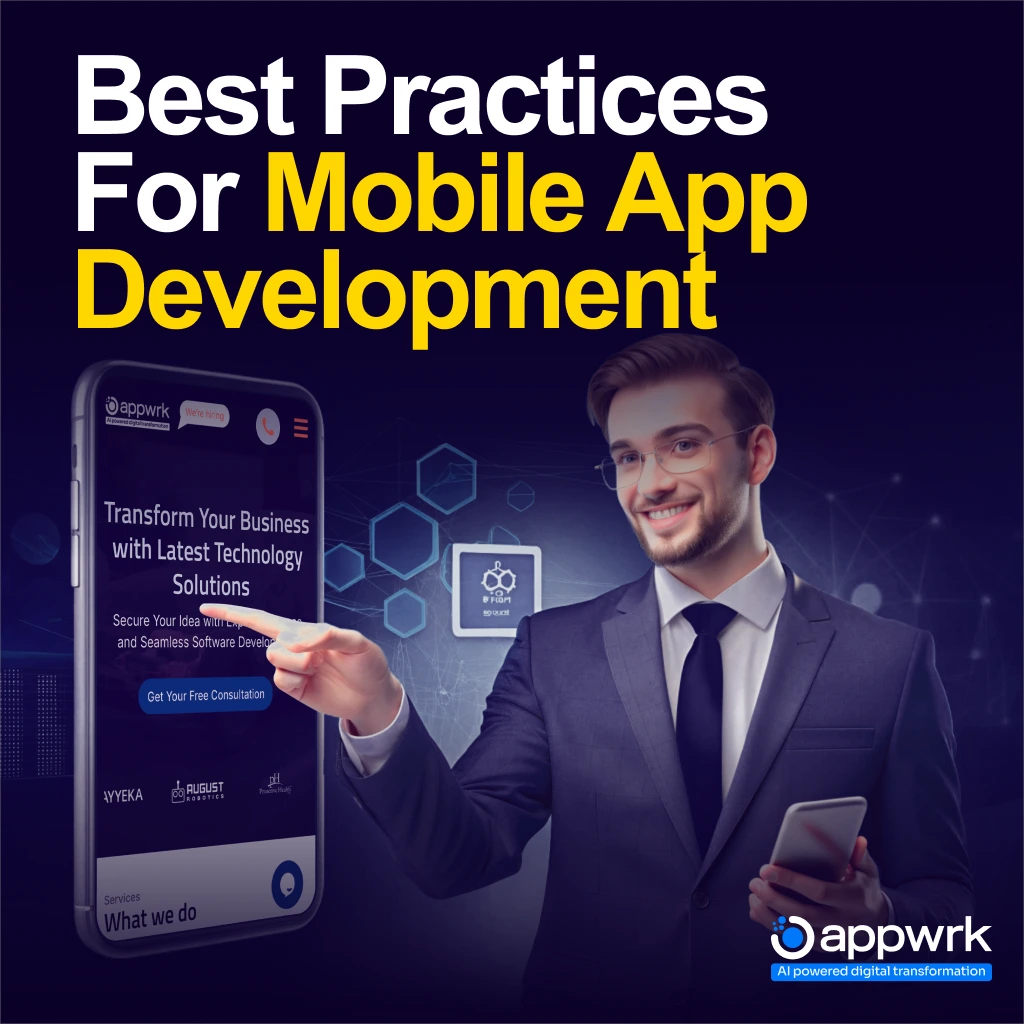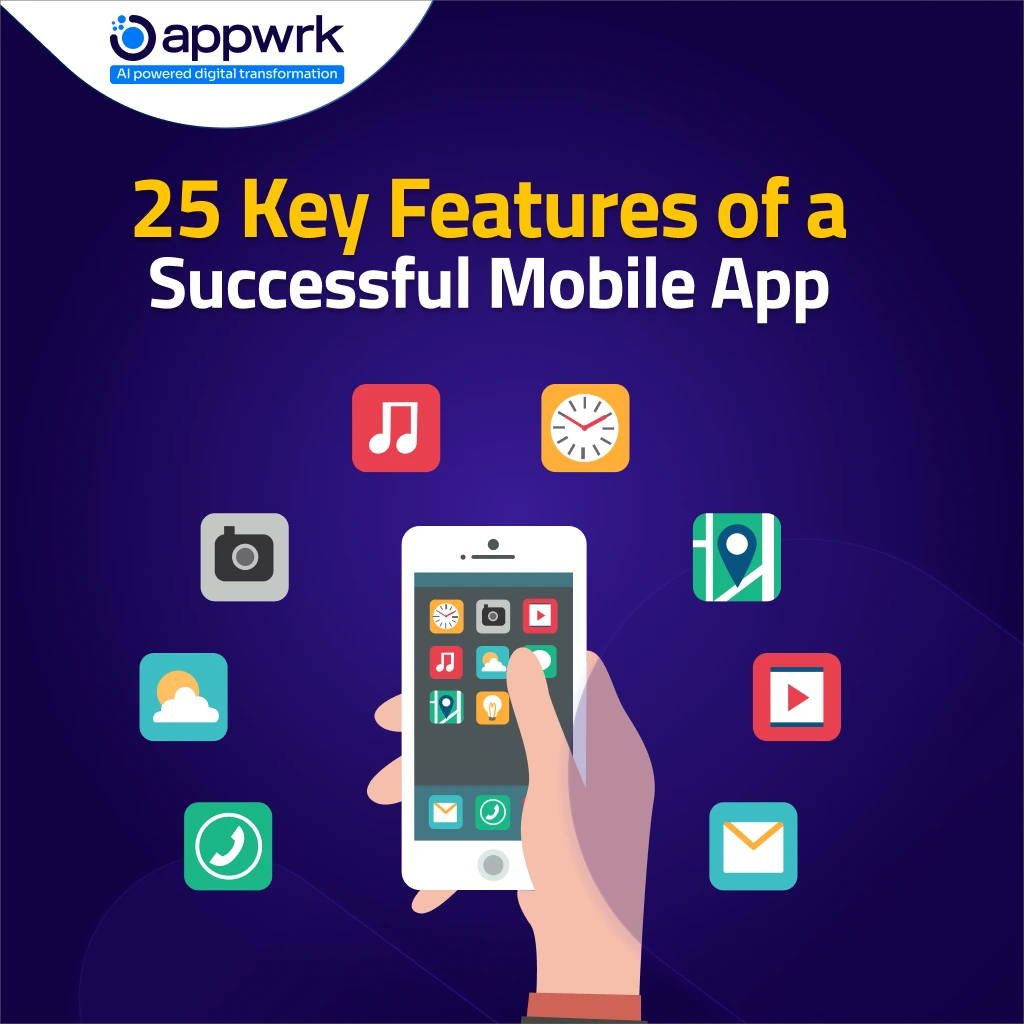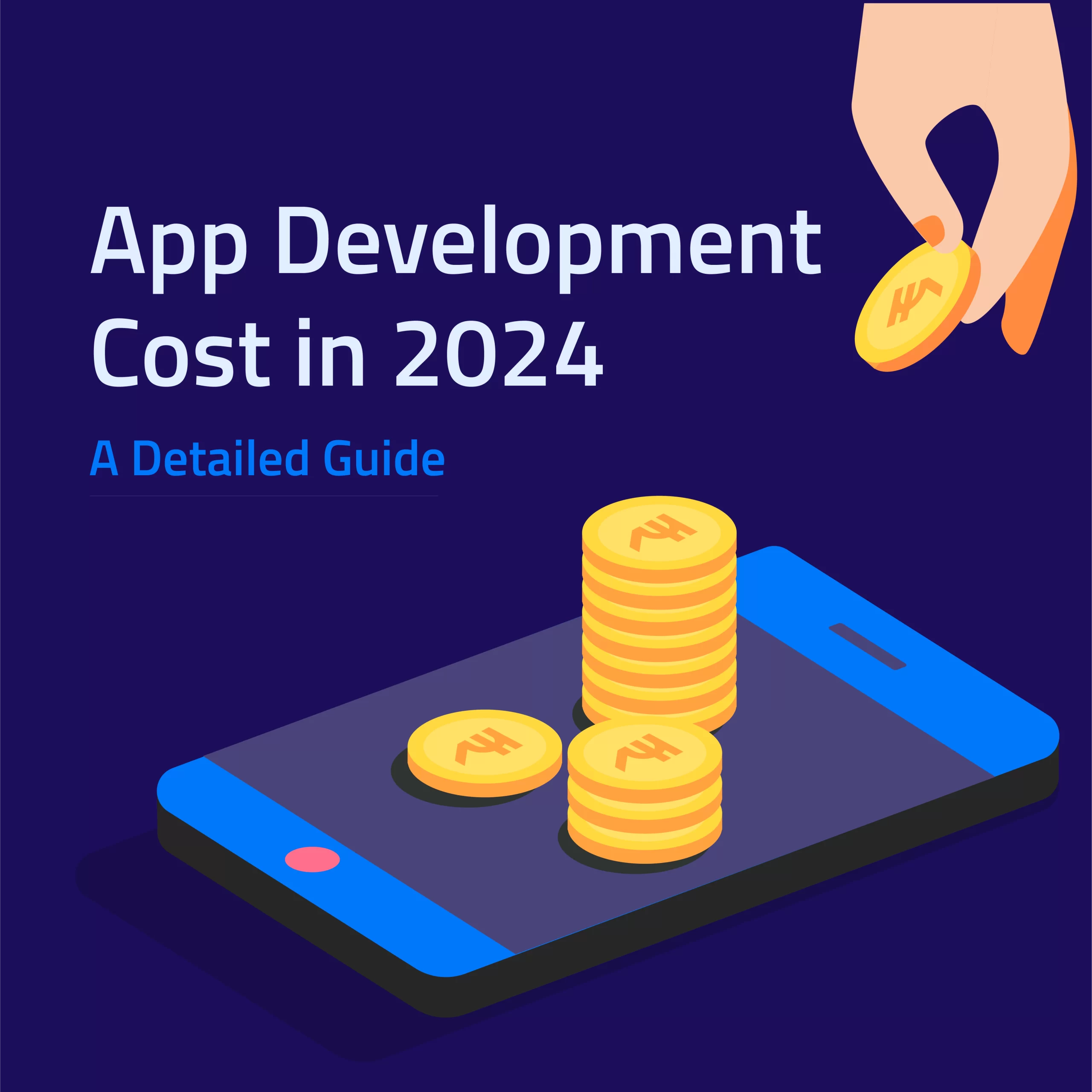What is Mobile App Development?
The number of mobile applications has skyrocketed these past few years. With the escalating penetration of better internet connectivity and modern smartphones, as well as the growing use of smart mobile devices, we can expect that the demand for Mobile App Development will continuously increase over the following years.
The global mobile app market is now valued at US$ 112.6 Bn. This figure is projected to hit more than US$ 307 Bn by the end of 2031. We can also expect the global mobile application market’s Compound Annual Growth Rate (CAGR) to grow to 12.4% over the next decade.
Regardless of your industry, you’ll need to ensure that you stay relevant to thrive in today’s highly competitive market. The best way to keep up with the competition is to leverage the power of mobile applications and invest in Mobile App Development.
Let’s deep dive into it.

Table of contents
- What are the Different Types of Mobile Applications?
- What are the Major Mobile Application Development Platforms?
- What are the Benefits of Creating a Mobile Application?
- How Long Does it Take to Build an App?
- What is the Cost of Mobile Application Development?
- How to Hire the Right Mobile Application Development Company?
- Endnote
Mobile application development is the process, procedure, or act of designing and building software applications that run on hand-held wireless computing devices like smartphones. These software applications are specifically written for the unique features of the target mobile device. Examples of these software applications are social media, health and fitness, game, entertainment, educational, and mobile banking apps.
This building process involves using a network or wireless internet to connect with the remote computing resources. It also consists of implementing backend services and creating software bundles that can be installed on mobile devices. Also part of the Mobile Application Development process is testing the developed app on target devices.
Now that you already know what mobile app development is let us introduce the four different types of mobile apps.
What are the Different Types of Mobile Applications?

One of the most important things you need to consider when building a mobile application is choosing the right type of mobile app. There are currently four different types of mobile apps or development approaches designers and developers use when creating mobile applications.
- Native apps
- Cross-platform apps
- Progressive web apps
- Hybrid apps
To help you decide which one to choose, let us discuss these different types of mobile apps below.
Native Apps
Native mobile applications are those apps designed and built for one specific operating system or platform. They are created using IDEs or integrated development environments. This type of mobile app is written specifically for the programming framework or language supported by the mobile platform owner like Google Android and Apple iOS. It runs directly on the device’s OS.
Advantages of native apps
Native apps offer the best runtime performance. Because this type of mobile app is specifically created for a singular focus, its performance is more reliable and faster than the others.
Native mobile apps directly connect to the device APIs, allowing better access to different device features, including camera roll, Bluetooth, NFC, contacts, and more. They also offer a better user experience since they use the native device UI.
Disadvantages of native apps
Although native apps can be customized, they can’t be mixed and matched. Because a native application is designed for a single OS or platform only, you can’t reuse it on another platform. A native app developed for Android can only run on Android devices and not on iOS platforms. If you need a similar application for another platform or OS, you will need to duplicate efforts and write a new code again. This makes native apps costlier compared to the other three types of mobile apps.
On top of that, the maintenance cost of a native app is also relatively high. Maintenance and updates can also be troublesome. You will have to download the new file and reinstall the application whenever an update is available. Needless to say, this can also eat up a considerable amount of device storage space.
Cross-platform Apps
Cross-platform apps are created for different devices, platforms, or operating systems. Although written in various programming frameworks and languages, this type of mobile app is compiled into a native app that can run directly on the device’s OS.
Advantages of cross-platform apps
The best thing about cross-platform applications is the ability to reuse the code on multiple platforms. Unlike native apps, you don’t have to write a new code again when you want to run the app on another OS or use it for a specific native platform.
Since you can use the codebase on different platforms, developing an application for multiple devices no longer requires duplicate efforts, making it easier to build. This, in return, can lead to lower Mobile App Development costs and shorter development time.
Disadvantages of cross-platform apps
Cross-platform apps are dependent on libraries and bridges for native device features. This results in performance limitations. Updates are also slower than native apps. Since cross-platform apps are made to fit multiple platforms, the app’s quality becomes lower compared to native apps.
Progressive Web Apps
Progressive web apps are native applications that run on a browser. You can also say that a progressive web app is basically a responsive website that behaves, appears, and runs like a native mobile app. It is an alternative approach to Mobile App Development that offers the best of the mobile app and the web.
Advantages of progressive web apps
A progressive web app adapts its UI to the user’s device and is designed to fit different mobile device screen sizes without changing designs. It can run on other platforms or operating systems without needing customization for each OS. This helps reduce development and maintenance costs.
Building a progressive web app is your best option if you want an app that doesn’t require installations, or perhaps you want to skip app store delivery. Since users don’t need to download the web app, it won’t consume any storage space on the user’s device memory.
Disadvantages of progressive web apps
A progressive web app ultimately depends on the browsers, and so is the user experience. Since different browsers have different features and functionalities, the app capabilities and user experience will also vary accordingly.
Apart from that, progressive web applications can only be accessed when connected to an internet network because it does not work offline. Some progressive web apps offer offline mode, though. However, the functionalities and features they offer are pretty limited.
Hybrid Apps
Hybrid apps are like a combination of a progressive web app and a native app. Like a native application, a hybrid application can be installed on smartphones. A hybrid app feels and looks like a native mobile application but runs through a native browser. It’s based on web views like WebView for Android and UIWebView for iOS.
Advantages of hybrid apps
A hybrid application renders performance and user experience closely similar to that of a native app. Unlike native applications, hybrid apps do not require recoding for each platform. You can use a single code for multiple platforms. This makes hybrid apps more cost-effective and faster to build than native apps.
Hybrid applications are the best choice for areas with slow internet connectivity. They also require minimal code maintenance since they only utilize one code base.
Disadvantages of hybrid apps
Hybrid apps’ speed, performance, and power are much lower than native apps.
Below is a quick comparison of the four different types of mobile applications.
| Type | Pros | Cons | Tools and Technology | Best For |
| Native Apps | – Best runtime performance – Native UI – Direct access to device APIs and features | – High development and maintenance cost – Multiple codebases per platform – Consumes more device storage space – Updates need to be downloaded | Can be coded in different programming languages like: – React – Swift – Java – Python – C++ – Kotlin – Objective-C | Developing separate apps for iOS and Android |
| Cross-Platform Apps | – One codebase for different platforms – Low development and maintenance cost | – Dependent on libraries and bridges for native device features – Bridging limits performance – Lower app quality – Slow app updates | Works with tools and frameworks like: – NativeScript – Ionic – Xamarin – Sencha Touch – React Native – Appcelerator – Titanium – Flutter – Corona SDK – Node.js – PhoneGap | Developing one app that can run on both iOS and Android |
| Progressive Web Apps | – Feature-rich – Offers a mobile app-like experience – Performs on different devices, OS, and screen sizes – Accessible through a URL – No installation is needed – Easier to maintain – Does not consume device storage space | – Does not work offline, requires internet connection – Entirely dependent on browsers – Limited support and integration for native device features | Programming languages for the web like: – Ruby – CSS – HTML5 – JavaScript | Best choice if you want an app that doesn’t require installation or if you want to skip app store delivery |
| Hybrid Apps | – One codebase for multiple platforms – Renders performance and a user experience similar to a native app – Low code maintenance – Cheaper and faster to build – Quick load time | – Limited support and integration for native device features – Lower power, performance, and speed than native apps | Native APIs and web technologies like: – Objective C – HTML5 – Ionic – Swift | Streamlining the mobile app development process |
Now that you’ve learned about the different mobile apps, let’s check the major mobile application development platforms.
What are the Major Mobile Application Development Platforms?
Mobile app development platforms or MADPs are a suite of software, technologies, tools, and services used for designing, developing, building, maintaining, deploying, and testing mobile apps across different devices and platforms. MADPs help reduce development costs and streamline the development process. Among the major mobile app development platforms available today include:
- Ionic
- Flutter
- Alpha Anywhere
- Unity Ads
- Microsoft Xamarin
- Sencha
- NativeScript
- React Native
- Mendix
- Adobe PhoneGap (Cordova)
Developing multiple single mobile applications that are compatible with the different devices, networks, and platforms can be pretty challenging. Thanks to the availability of MADPs, you can now consider this a thing of the past. Nowadays, you’ll only need one codebase to maintain in order to ensure compatibility across various networks, devices, and platforms.
To know more about the mobile app development frameworks, you may consider checking our post: What are the Best Cross-Platform and No-Code App Development Frameworks in 2022?
APPWRK
Are you getting enough learning about Mobile App Development? Not so fast. We still have more topics to talk about today. And the next one would be the benefits of Mobile App Development.
What are the Benefits of Creating a Mobile Application?
We are now in an era where almost everyone in our society has become heavily reliant on smartphones. Nowadays, people and smartphones are becoming inextricable. Smartphones play a critical role in our daily lives- from the moment we open our eyes in the morning (talk about waking up with our phone’s alarm clock) until we get back to bed to rest at night.
More than just for communication, mobile phones now serve many purposes and offer more functionalities, e.g., adjusting the lighting and thermostat, monitoring our home’s CCTV camera, entertainment, socialization, collaboration with workmates, and many more. These functionalities are made available through different mobile applications.
If you are an entrepreneur looking for a viable project, investing in Mobile App Development would be wise. You need to go where your customers and target users are and where they will be in the future. And this avenue is the mobile world.
Aren’t you convinced yet? Well, check out these primary benefits of mobile app development.
- Allows you better understanding and insight of your customers/users
- Enables you to connect with your customers quickly, conveniently, and efficiently
- Helps build customer trust and loyalty
- Makes you accessible to your users/customers 24/7
- Allows better and faster customer support
- Helps improve customer engagement
- Maximizes conversions
- Helps build your brand
- Provides personal and direct marketing channel
- Boosts productivity
- Reduces costs
- Assists in delivering immersive UX
- Allows you to provide more value to your users or customers
- Mobile apps are relatively more reliable than websites
- Provides you with a competitive edge in your industry
These are just some of the many benefits of creating a mobile application for your business. Now, let’s move on to the amount of time required to build a mobile app.
How Long Does it Take to Build an App?
The time needed to complete one mobile application depends on different factors, including the app’s type and complexity, the development team’s size and competence, and the features you want to integrate into the app.
Generally, it will take an average of two to three months, three to six months, and at least nine months to build simple, basic, and complex mobile applications, respectively. These timeframes include the different processes and stages, including planning, design, development, and pre-launch phases.

What is the Cost of Mobile Application Development?
The cost of building a mobile app is dependent on factors like:
- Type and complexity of the mobile application
- Time required to complete the entire development process
- Cost of hiring the development team
Here at APPWRK IT Solutions, we offer different pricing models:
- Hourly (starts at $18/hr)
- Full-time (starts at $2800/mo)
- Part-time (starts at $2000/mo)
How to Hire the Right Mobile Application Development Company?
Hiring a professional mobile app development company offers you many benefits. These benefits include access to the latest tools and technologies, better flexibility regarding overall costs, reduced risks, faster and more effective product deployment, improved compliance, and lower development costs. To reap these many benefits, you must first find the right mobile app development team.
Below are handy tips on how you can find and hire the right mobile app development company.
- Choose between hiring an in-house team, outsourcing to a freelancer, and partnering with a certified mobile app development company.
- Check the top-rated mobile app developers listed on the most reliable sources online for mobile app development like Upwork, Clutch, and Top developers. Read some reviews given by their previous clients and shortlist the ones that fit your criteria.
- Check the development company’s pricing models, development team size, technology stack, success rate, and portfolio. This information will help you assess the competence and reliability of the company.
- Discuss coding, programming, troubleshooting, and other technical stuff related to your project, so you will know whether or not the developer possesses the relevant skills and experience required for completing your project.
- Ask about after-development support. A mobile app development project does not end with the app’s creation but beyond. Knowing if the company offers after-development support services like conducting preventive and regular maintenance, software implementation monitoring, backup services, and troubleshooting is critical.
The success of your mobile app project depends heavily on your development partner. You can use these tips to find the mobile app development company that best fits your needs.
Endnote
The Mobile App Development market is steadily growing and will continue to flourish in the next couple of years. If you want to take a portion of the massive mobile app market pie and stay relevant, you’ll need to consider creating a mobile app for your business.
Hopefully, this post has helped enlighten you about Mobile Application Development and how it can potentially help grow your business. To know more, you may want to see our comprehensive guide on custom mobile app development for start-ups.
At APPWRK IT Solutions, our mobile application development team has already produced hundreds of successful, innovative, high-quality, and unique mobile applications for different global brands and industries. If you need assistance regarding mobile app development, just give us a ring! We’re always at your service.
Related Links:
About The Author







 Free Quote
Free Quote
















































